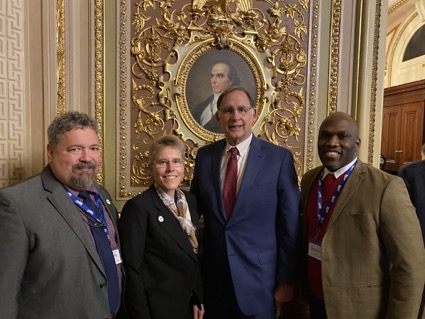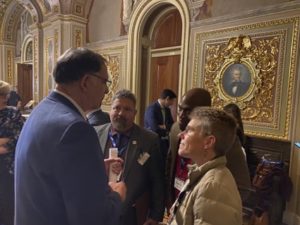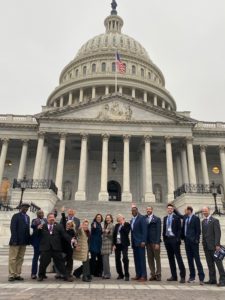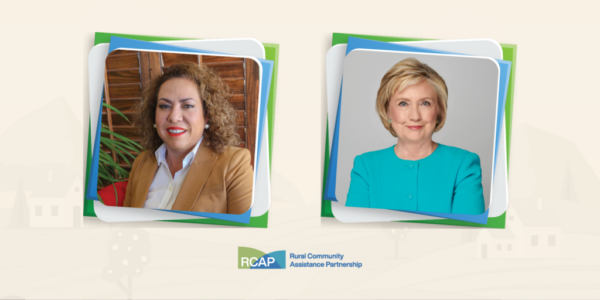A Look Inside RCAP’s Fly-In: Sharing the Stories and Needs of Rural Communities with Congress

From February 28 to March 3, 2022, the Rural Community Assistance Partnership (RCAP) will host our annual Fly-In in Washington D.C. This event brings representatives from our six regional partners from across the country to meet with government agencies and to generate awareness for rural issues on Capitol Hill. Representatives meet with their members of Congress and reinforce the importance and value of federal programs for rural economic development and water and wastewater infrastructure.
To get an inside perspective on the Fly-In, I sat down with Brad Jarrett, the Arkansas State Coordinator for our southern partner, Communities Unlimited (CU). Jarrett has worked with CU for 12 years and has attended the Fly-In since 2020.
Tell me a little about your work with CU.
I work mostly on the environmental team. We do technical assistance for small, rural, underserved communities regarding community facilities for water and wastewater. Over the years, I have seen a need for this kind of technical assistance in small communities. We do a lot of good when we can connect their resources with our expertise and training. We bring a lot of good to the communities to empower them and help their water and wastewater operations function effectively.
How many Fly-Ins have you attended?
I’ve participated in two Fly-Ins so far, and I’m looking forward to my third this year! In 2019, I was promoted to the role of State Coordinator in Arkansas, and immediately began to look to attending the Fly-In. In 2020, I participated in person on Capitol Hill. In 2021, it was a virtual event, like this year.
For those unfamiliar, tell me about the Fly-In.
In person, it is very busy. You’re going up and down the Hill, talking with senators and representatives, or sitting in on meetings with others. I usually meet with members of Congress from Arkansas. It’s also a great opportunity to talk with your fellow technical assistance providers (TAP) to share experiences and knowledge. It is tiring and busy, but fun and rewarding because we are able to promote the work we are doing on the ground. Members of Congress always want to know what is going on in their areas, so we talk about the projects we have in the communities they serve.
As a TAP, what is the Fly-In like?
The best part of the Fly-In is really connecting. When you are at the Fly-In, it is a learning experience to be able to see firsthand what is on the mind of members of Congress. We want them to understand what we see on the ground. We want them to see exactly how funding impacts these underserved communities. It means a lot to me to be able to communicate with them. Not only are we providing technical assistance in the communities, but we are also communicating its impact to congressional leaders. We get to say, “This is where the need is, we see it.”
Sometimes, a member of Congress or their staff might have grown up in the communities we are talking about. I’ve met with staff from Senator Boozman’s office who are from the communities CU works in. In one meeting, I bonded with a staffer over a common local restaurant, Joe’s Diner. Joe’s Diner has these little crab claws that everyone loves. So we were able to talk and connect around a shared experience.
Have you had any stand-out experiences?
In 2020, Senator Boozman was coming off the Senate floor and couldn’t make our meeting. But he didn’t want us to leave without talking to him. He wanted to hear about our work in Arkansas. So, his staff took our team underground through the Senate, and we met him coming off the floor.
What do you think the impact of the Fly-In is for your local communities?
It is huge. The communities need a voice, and we are the voice. The communities know what technical assistance is needed, but they may need us to articulate it and share their stories. It is vital to share the importance of technical assistance. Before a community joins with CU, they may be struggling to meet compliance, get new infrastructure, or save money. When we help to provide these resources, like technical assistance and training, it helps them so much. When we complete a project, communities are always looking for more ways we can help them.
At the Fly-In, I’m there to listen to the congressional staff, but I’m there to tell the communities’ stories. I’m there to say, “We need this.” In 2021, with the virtual Fly-In, we had a local mayor, Mayor Tonya Kendrix of Hermitage, AR, get on the call. She was able to tell Senator Boozman about the assistance her community has received.
Do you have any advice for someone attending the Fly-In for the first time?
Be mindful of the process and context, especially virtually. It is your opportunity to ask questions and learn. Try to understand the big picture. I’d recommend attending the general sessions where everyone is speaking. I always want to attend those because it is a learning experience. I love to fish, I don’t care how many times I have gone fishing, I always learn something new. New things come up all the time in the field we work in, and we want to be ready for them. My advice is to take it all in, be as flexible as you can, and don’t be afraid to help out. It is a challenge but it is a learning experience.
Anything else?
To all the new people joining RCAP or experiencing the first Fly-In, every region in RCAP will support you. We work in a great network and everyone from the other regions is there to help. We are all working towards the same goals!
Learn more about the Fly-In here and follow along on Twitter with the hashtag #RCAPOnTheHill2022
Watch this video about CU’s work with Mayor Tonya Kendrix in Hermitage, AR https://vimeo.com/675469099


